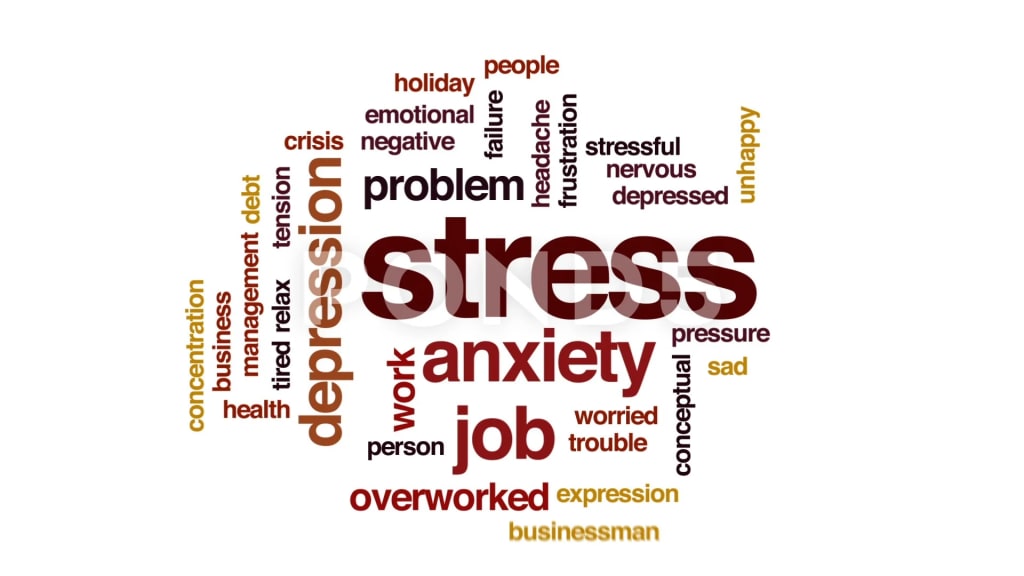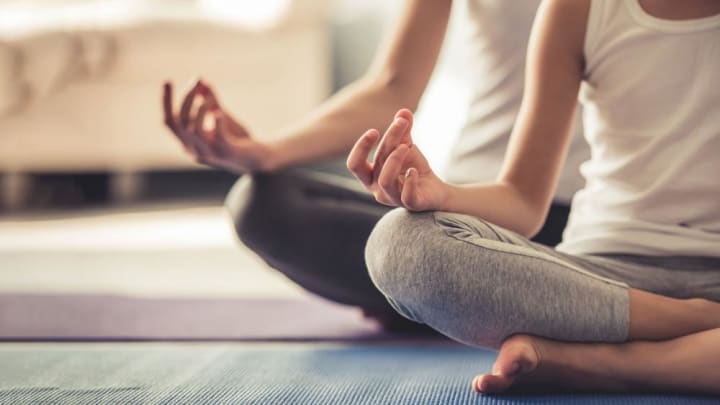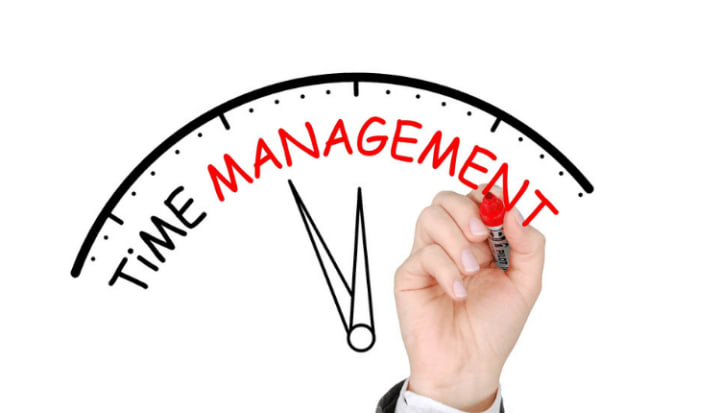The effects of stress on the body and mind, and how to manage it
here are the effective ways to manage.....

Stress can have a significant impact on both the body and mind. When a person experiences stress, the body releases hormones such as cortisol and adrenaline, which can cause a wide range of physical and mental symptoms.
> On the physical side, stress can lead to headaches, muscle tension, fatigue, stomach problems, and increased risk of chronic conditions such as heart disease and diabetes. Stress can also lead to sleep problems, including insomnia and nightmares, which can further exacerbate the effects of stress.
> On the mental side, stress can lead to feelings of anxiety, depression, irritability, and mood swings. It can also affect a person's ability to concentrate, think clearly, and make decisions. Stress can also contribute to the development of mental health conditions such as PTSD, and Generalized Anxiety Disorder.
Fortunately, there are a variety of ways to manage stress, including:

Exercise: Exercise is a powerful tool for managing stress. Regular physical activity can help reduce stress by releasing endorphins, which are natural mood-boosters. It also helps to reduce the levels of stress hormones such as cortisol, and also helps to release tension in the muscles, which can be a physical manifestation of stress.
>Exercise can take many forms, from traditional activities such as running or weightlifting, to more low-impact options such as yoga or swimming. The key is to find an activity that you enjoy and can make a regular part of your routine.
> Aerobic exercises such as cycling, running, swimming, or brisk walking are particularly effective at reducing stress. They increase the heart rate, which helps to pump more oxygen and nutrients to the brain, and they also release endorphins, which help to improve mood.
> Strength training exercises such as weightlifting can also help to reduce stress. They help to build muscle, which can improve overall physical health and also promote feelings of self-confidence and self-esteem.
> Yoga and tai chi are also great options for reducing stress. They both involve gentle movements, deep breathing, and mindfulness, which can help to promote relaxation and reduce feelings of anxiety and stress.
> The benefits of exercise for stress management can be improved with the combination of physical activity with mindfulness practices like meditation. This combination can help to reduce stress, improve mood, and promote overall well-being.
> It's important to note that everyone is different and it may take some experimenting to find the right type of exercise that works best for you. It's also recommended to consult with a doctor before starting any new exercise program, especially if you have any pre-existing health conditions

Yoga and meditation: Yoga and meditation are two practices that can be very effective in managing stress. Both involve elements of relaxation, mindfulness, and self-awareness, which can help to reduce feelings of anxiety and promote overall well-being.
> Yoga is a physical practice that involves a series of postures, breathing exercises, and meditation. It helps to promote relaxation by stretching and strengthening the muscles, and it also helps to improve focus and concentration by promoting mindfulness. Yoga can also help to reduce feelings of anxiety and depression by promoting feelings of calm and inner peace.
> Meditation is a practice that involves focusing the mind on a particular object, thought, or activity to increase awareness of the present moment, and achieve a mentally clear and emotionally calm state. It can be practiced in different ways, such as guided meditation, mindfulness meditation, or Transcendental Meditation. It can help to reduce stress by promoting relaxation and reducing feelings of anxiety, it also improves mental focus, clarity, and emotional well-being.
> Both yoga and meditation can be practiced in different settings, such as in a class, at home, or in nature. There are also different styles and variations to choose from, so it's important to experiment and find what works best for you.
> It's worth noting that regular practice is key to getting the most benefits. Both yoga and meditation can be challenging at first, but with time and consistency, they can become a valuable tool for managing stress and promoting overall well-being.
Relaxation techniques: Relaxation techniques are methods that can help to reduce stress and promote relaxation by releasing tension in the muscles and calming the mind. There are many different relaxation techniques to choose from, and the best one for you will depend on your personal preferences and lifestyle. Some popular relaxation techniques include:
> Deep breathing: This involves taking slow, deep breaths, and focusing on the sensation of the breath as it enters and leaves the body. It helps to release tension in the muscles and promote relaxation by slowing down the heart rate and calming the mind.
> Progressive muscle relaxation: This technique involves tensing and then relaxing different muscle groups in the body, starting with the feet and working up to the head. This helps to release tension in the muscles and promote relaxation by increasing awareness of physical sensations.
> Guided imagery: This technique involves using your imagination to create mental images of peaceful, calming scenes. It can be used to promote relaxation and reduce feelings of anxiety by allowing the mind to focus on something other than stressors.
> Autogenic training: This technique involves repeating a set of phrases, such as "my right arm is heavy" or "my heart is calm" to promote physical and emotional relaxation.
> Biofeedback: It is a process of learning how to control certain physiological functions, such as heart rate, blood pressure, and muscle tension, with the help of electronic devices or sensors.
> lf-massage: This technique involves massaging your own body, often with the help of lotions or oils. It can help to release tension in the muscles and promote relaxation by increasing circulation and releasing endorphins.
*it's important to note that these techniques may take some time and practice to master, so it's important to be patient and consistent with your practice. It's also important to consult with a healthcare professional before starting any new relaxation techniques, especially if you have any pre-existing health conditions.

Time management: Time management is the practice of organizing and planning how to allocate time effectively and efficiently. It can be a powerful tool for managing stress by reducing feelings of overwhelm and improving overall productivity. Some tips for effective time management include:
> Setting clear goals: Start by identifying what you want to achieve and then break it down into smaller, more manageable tasks.
> Prioritizing tasks: Identify the most important tasks and tackle them first. This can help to ensure that the most important things get done, and also reduce feelings of overwhelm.
> Eliminating distractions: Identify and eliminate distractions, such as social media or email, that can take up valuable time.
> Using a planner or calendar: Use a planner or calendar to schedule your tasks, appointments, and deadlines. This can help to ensure that you stay on track and don't forget important things.
> Taking regular breaks: Taking regular breaks can help to reduce feelings of burnout and improve overall productivity.
> Learn to say no: Saying no to non-essential tasks or activities can help to reduce feelings of overwhelm and free up time for more important things.
> Delegation: If possible, delegate some of the tasks to others, this can help to reduce the workload and also improve teamwork.
> Time-blocking: This technique involves allocating specific blocks of time for specific tasks, this can help to stay focused and avoid procrastination.
> It's important to note that time management is a continuous process, and it's important to be flexible and adapt to changes in priorities and circumstances. It's also important to be mindful of your own limitations, and to avoid overloading yourself with too many tasks.Social support: Talking to friends and family, joining a support group, or seeking the help of a therapist can provide much needed support and perspective during times of stress.

Sleep: Sleep is essential for overall health and well-being, and it's also crucial for managing stress. When we sleep, our bodies and minds are able to rest and repair, which is essential for maintaining physical and mental health. However, stress can interfere with sleep, and lack of sleep can further exacerbate the effects of stress.
> Stress can cause insomnia, nightmares, and night sweats, which can make it difficult to get a good night's sleep. Inadequate sleep can also lead to feelings of fatigue and irritability, which can make it more difficult to cope with stress.
> To improve sleep and manage stress, it's important to establish a regular sleep routine. This includes going to bed and waking up at the same time every day, avoiding caffeine and heavy meals close to bedtime, and creating a comfortable and relaxing sleep environment.
> Relaxation techniques such as deep breathing, progressive muscle relaxation, or guided imagery can also be helpful in promoting relaxation and reducing feelings of anxiety before bedtime.
> It's also important to avoid using electronic devices such as smartphones, laptops, or tablets before bed as the blue light emitted by these devices can interfere with the production of melatonin, a hormone that regulates sleep.
> Incorporating regular exercise into your daily routine can also improve sleep quality. Exercise can help to reduce feelings of stress and anxiety and also improve physical health, both of which can help to promote better sleep.
> If you are having difficulty falling asleep, staying asleep or wake up feeling unrefreshed, it's important to talk to your doctor, as there might be an underlying condition that needs medical attention.Nutrition: Eating a healthy diet, and avoiding or limiting alcohol and caffeine consumption can help manage stress.

Social support: Social support is the network of family, friends, and other people in our lives who can provide emotional, practical, and social support. Social support can be a powerful tool for managing stress by providing a sense of connection, a sounding board for our thoughts and feelings, and a source of perspective and guidance.
Having people to talk to can provide a sense of validation, and can help to reduce feelings of isolation, anxiety, and depression. It can also help to provide a different perspective on problems and stressors, which can help to reduce feelings of helplessness and hopelessness.
There are different ways to get social support, such as:
> Talking to friends and family: Sharing your thoughts and feelings with loved ones can provide a sense of connection and understanding.
> Joining a support group: Joining a support group for people who are experiencing similar issues can provide a sense of community and shared understanding.
> Seeking the help of a therapist or counselor: A therapist or counselor can provide a safe and confidential space to talk through your thoughts and feelings and can also provide guidance and support in dealing with stress.
> Building new connections: Joining clubs, organizations, or groups that align with your interests can help to build new connections and friendships.
> it's important to note that social support doesn't mean that you always have to be surrounded by people, it's also possible to feel supported by simply knowing that you have people in your life who care about you and are there for you.
> It's also important to be mindful of the quality of the social support, some people may be more supportive than others, and it's important to surround yourself with people that are understanding, non-judgmental, and able to provide emotional support.

Nutrition: it plays an important role in managing stress. What we eat can affect our energy levels, mood, and overall well-being. Eating a balanced and nutritious diet can help to support the body and mind during times of stress.
Some tips for incorporating stress-reducing foods into your diet include:
> Eating a diet rich in fruits and vegetables: Fruits and vegetables are good sources of vitamins, minerals, and antioxidants that can help to support the body and mind during times of stress.
> Incorporating lean protein into your diet: Protein is essential for maintaining and repairing the body, and can help to promote feelings of fullness and satisfaction. Good sources of protein include fish, poultry, beans, and nuts.
> Eating complex carbohydrates: Whole grains, fruits and vegetables, and legumes are good sources of complex carbohydrates, they help to provide sustained energy throughout the day, and can also help to improve mood by increasing the production of serotonin.
> Incorporating healthy fats: Healthy fats such as those found in nuts, seeds, avocados, and fatty fish can help to promote feelings of fullness and satisfaction. They also help to reduce inflammation which can be a byproduct of stress.
> Drinking enough water: Drinking enough water is essential for overall health, and can help to promote feelings of fullness and reduce feelings of fatigue.
> Limiting alcohol and caffeine consumption: Consuming excessive amounts of alcohol and caffeine can interfere with sleep, and can also exacerbate feelings of anxiety and irritability.
> It's also important to note that nutrition and stress management are closely linked, and that stress can also affect our eating habits, it's important to be mindful of emotional eating and try to address the root cause of stress rather than using food as a coping mechanism.
> It's important to consult with a healthcare professional or a nutritionist before making any drastic changes to your diet, especially if you have any pre-existing health conditions.
conclusion: stress is a normal part of life, but when it becomes chronic it can have a negative impact on both physical and mental health. There are many ways to manage stress, including exercise, yoga and meditation, relaxation techniques, time management, social support, sleep and nutrition. Finding what works best for you may take some experimentation and consistency is key for achieving the most benefits. It's also important to remember that seeking professional help, such as from a therapist or counselor, can be valuable in managing stress and addressing underlying issues. Remember that self-care is essential for overall well-being, it's important to take the time to take care of yourself, to relax and to engage in activities that bring joy and fulfillment.
About the Creator
Enjoyed the story? Support the Creator.
Subscribe for free to receive all their stories in your feed. You could also pledge your support or give them a one-off tip, letting them know you appreciate their work.






Comments
There are no comments for this story
Be the first to respond and start the conversation.